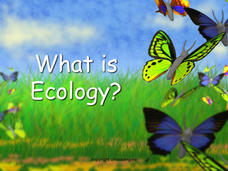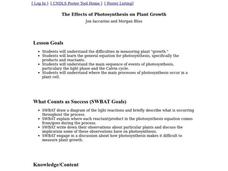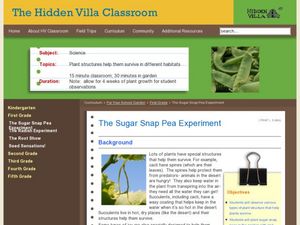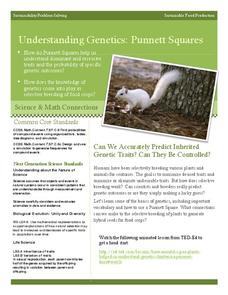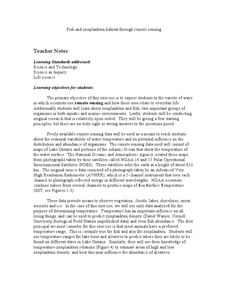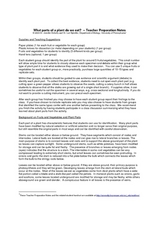Curated OER
Diversity and Adaptation
Tenth graders explore structure, function and variation among species. Through field observations, lab activities and homework, 10th graders observe and record examples of adaptation and variation.
Curated OER
What Is In The Water?
Students investigate the biotic and abiotic factors that are found in an aquatic ecosystem. The emphasis is upon the investigation of present an projections of future water quality. Then students visit a local body of water to gather...
University of Minnesota
Chemotaxis Using C. elegans
Have you ever wondered what roundworms are like? Or what they don't like? Explore the sensory preferences of C. elegans through this controlled chemotaxis experiment. Biology class members brainstorm what substances might attract—or...
Biology Junction
What Is Ecology?
Do you know the name for the biological study of interactions? A short presentation with accompanying worksheet introduces individuals to ecology. The materials offer a broad overview of the subject and the levels of organization to...
Curated OER
The Effects of Photosynthesis on Plant Growth
Students are able to draw a diagram of the light reactions and briefly describe what is occurring throughout the process. They are able to explain where each reactant/product in the photosynthesis equation comes from/goes during the...
Curated OER
Raven Chapter 13 Guided Notes: Patterns of Inheritance
In this short space, it would be impossible to describe the breadth of this seven-page genetics worksheet. Geared toward AP or college biology learners, they explore not only the basic vocabulary and concepts, but also the Law of...
Curated OER
Fossils!
Students explore what fossils are, how they are formed, what different types there are and why they are significant to both our present and past geology history. They participate in a hands on fossil observation of their choice and...
Curated OER
The Sugar Snap Pea Experiment
Students examine types of plant structure. In this plant biology lesson, students observe various types of plants, such as ivy and grapes, and discuss the differences in structure. Additionally, students plant sugar snap peas, using a...
Teach Engineering
Creepy Silly Putty
It might be silly to determine the creep rate of putty but groups will enjoy making different formulations of silly putty and playing with them to understand how the different mixtures behave. The second part of the activity has groups...
University of Hawaiʻi
Taxonomy and Me!
Taxonomy is the study of organisms and how you phylum. Three biology activities are included, helping scholars understand four of the six kingdoms, specifically Protista, Plantae, Fungi, and Animalia. Scholars observe and classify...
Nuffield Foundation
Enzyme-Catalysed Synthesis
Enzymes: not just for breaking chemicals apart. Young biologists perform an experiment on potatoes. They first remove starch from potato extract. They then add the resulting liquid to samples of glucose-1-phosphate, glucose, maltose, and...
Cornell University
Bacteria Take Over and Down
Bacteria outnumber all other forms of life on Earth. Scholars observe the growth of bacteria in petri dishes to understand their role in maintaining good health. Then, they observe the growth of bacteria after they introduce...
Biology Junction
Protein Synthesis
Watson and Crick built the first model of DNA in the 1950s, and our understanding of DNA since then continues to grow exponentially. Scholars learn about protein synthesis by observing a presentation and completing a worksheet. Both walk...
Western Kentucky University
Understanding Genetics: Punnett Squares
Can scientists really predict genetic outcomes or are they simply making a lucky guess? Scholars first learn about Gregor Mendel and how to make Punnett squares. Then they extract DNA from a strawberry in a lab with included conclusion...
Curated OER
Semipermeable Membranes and Bioaccumulation
Beginning biologists place a drop of food coloring into water of differing temperatures to observe the effect on the diffusion rate. They remove the shells from raw eggs and then experiment with osmosis over the remaining membranes....
LABScI
Vision Lab: The Eye
Our bodies have some amazing capabilities, but there are some limitations. Explore the limitations of the human eye through the eighth lab activity in a series of 12 biology lessons. Individuals measure their own peripheral vision...
Curated OER
Fish and Zooplankton Through Remote Sensing
Ecology aces examine sea surface temperature maps and relate temperatures to concentration in fish and zooplankton populations. Take your class to a computer lab and provide experience with actual remote sensing data. Some of the links...
National Wildlife Federation
What's Your Habitat?
How are third graders like rabbits? They both live in habitats and require food, water, and shelter to survive! An educational science lesson encourages your learners to think about their own habitats and survival needs, before comparing...
NOAA
Please Pass the Salt
Salinity is the focus of two experimenters that work to answer the question, How does salt change the physical properties of water? Super scientists compare the freezing rate of salt and fresh water, combine the two waters to...
Cornell Lab of Ornithology
Life In A Nest: Exploring Life Cycles With Bird Cams
Why read about it when you can watch it happen? Bird cams make it possible for learners to experience the life cycle of a bird in real time! An engaging set of lessons provides activities to connect their learning to bird cam...
Kenan Fellows
Applying Linear Regression to Marathon Data
It's not a sprint, it's a marathon! Statistic concepts take time to develop and understand. A guided activity provides an opportunity for individuals to practice their linear regression techniques in spreadsheet software. The activity...
Curated OER
Do you see what I see?
Students examine the importance of making and recording observations and accurately describing an object. In this biology lesson students work in groups and report to the class what they learned.
Curated OER
Analysis of Lobster Claw Function. An Exercise in Biomechanics
Young scholars observe two chelae. They write three differences they observe in their notebooks. Students suggest a hypothesis which would explain these differences. They dissect the chela. Young scholars analyze the lobster claw as a...
Curated OER
Which Parts of a Plant Do We Eat?
Students identify the different parts of a plant. In this biology lesson, students examine its internal parts by dissecting it. They report their findings in class.





